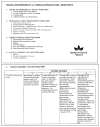Social responsibility in tobacco production? Tobacco companies' use of green supply chains to obscure the real costs of tobacco farming
- PMID: 21504915
- PMCID: PMC3155738
- DOI: 10.1136/tc.2010.039537
Social responsibility in tobacco production? Tobacco companies' use of green supply chains to obscure the real costs of tobacco farming
Abstract
Background: Tobacco companies have come under increased criticism because of environmental and labour practices related to growing tobacco in developing countries.
Methods: Analysis of tobacco industry documents, industry websites and interviews with tobacco farmers in Tanzania and tobacco farm workers, farm authorities, trade unionists, government officials and corporate executives from global tobacco leaf companies in Malawi.
Results: British American Tobacco and Philip Morris created supply chains in the 1990 s to improve production efficiency, control, access to markets and profits. In the 2000s, the companies used their supply chains in an attempt to legitimise their portrayals of tobacco farming as socially and environmentally friendly, rather than take meaningful steps to eliminate child labour and reduce deforestation in developing countries. The tobacco companies used nominal self-evaluation (not truly independent evaluators) and public relations to create the impression of social responsibility. The companies benefit from $1.2 billion in unpaid labour costs because of child labour and more than $64 million annually in costs that would have been made to avoid tobacco-related deforestation in the top 12 tobacco growing developing countries, far exceeding the money they spend nominally working to change these practices.
Conclusions: The tobacco industry uses green supply chains to make tobacco farming in developing countries appear sustainable while continuing to purchase leaf produced with child labour and high rates of deforestation. Strategies to counter green supply chain schemes include securing implementing protocols for the WHO Framework Convention on Tobacco Control to regulate the companies' practices at the farm level.
Conflict of interest statement
Figures


References
-
- World Health Organization. Framework Convention on Tobacco Control. [10 July 2008];2005 www.fctc.org/index.php?item=fctc-toc.
-
- World Health Organization. Decisions: Fourth Session; Punta Del Este, Uruguay. 15-20 November 2010; 2010. [January 4, 2011]. http://apps.who.int/gb/fctc/E/E_cop4.htm.
-
- Geist H, Chang K-t, Etges V, Abdallah J. Tobacco Growers at the Crossroads: Towards a Comparison of Diversification and Ecosystem Impacts. Land Use Policy. 2009;26:1066–1079.
-
- Geist H, Kapito J, Otañez M. The Tobacco Industry in Malawi: A Globalized Driver of Local Land Change. In: Jepson W, Millington A, editors. Land Change Modifications in the Developing World. Berlin, Germany: Springer; 2008. pp. 251–268.
Publication types
MeSH terms
Grants and funding
LinkOut - more resources
Full Text Sources
